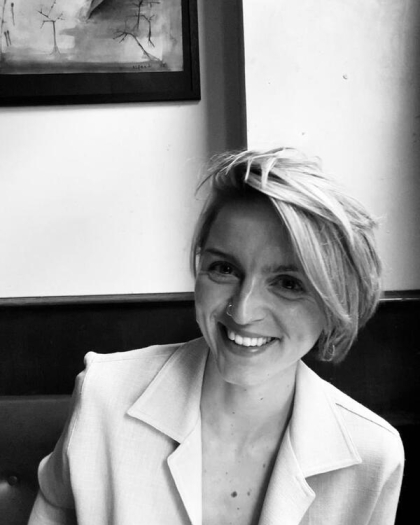Kort info
Forskning
My PhD project, (Up)rooted healing: the embodied epistemologies of iboga/ine use, explores the therapeutic use of the tabernanthe iboga plant, its main alkaloid ibogaine, and its (semi-)synthetic derivates across history and current sites in Gabon and Europe. This is done with the aim of tracing how different modes of knowing, experiencing, and evaluating iboga/ine’s healing efficacy interact and transform when the shrub’s roots are uprooted from one setting and emplanted to others.
I follow the plant from its indigenous habitat in Gabon, through newly cultivated iboga plantations that are increasingly occurring in the country as one means to create sustainable pathways for meeting the increasing global demand, and into its local context of initiation and healing rituals among Bwiti practitioners. From Gabon, I will track the iboga root on its past and present trails into Europe. Through archival research, I investigate its initial travels into and off the pharmaceutical market in the early 20th century. Through ethnographic fieldwork, I explore its current usage for addiction treatment and psychospiritual healing in iboga/ine retreat and treatment centres in Europe. Finally, I follow the plant into current clinical research where researchers explore the efficacy and safety of ibogaine in the treatment of opioid addiction.
My main interest is exploring what it means to heal to those involved in the interrelated user sites, what constitutes the actants of the therapeutic encounter, what counts as efficacy, and how these practices, network, and discourses interact and change in the ongoing process of re-making and re-interpreting the iboga/ine and its effects. With the project, I wish to track the living matter-flow of how iboga/ine comes to be known, experienced, and made into a ‘medicine’ through embodied engagements in different socio-cultural settings.
My master thesis explored individual and collective practices and understandings of psychedelic integration among psychedelic users in Denmark. This notion refers to the prolonged, therapeutic practice and process that follows after the more immediate psychedelic experience and the user is left with the task of making sense and use of it in the context of everyday existence.
Formidling
PRESENTATIONS
2024 Iboga(in) i set og setting: antropologiske og historiske perspektiver, public webinar at Center for Psykedelisk Dannelse
2024 Psychedelics are no magic pill’: the narrative and embodied dimensions of psychedelic integration in Denmark, Journal Club of the Psychedelics Society of Belgium (PSBE)
2022 Psychedelic integration – a relational affair?, public lecture at Hjerterum, Aarhus
2022 Podcast interview on psychedelic integration, Den Forbudte Skole
2021 ’No Magic Pill’ – glimpses from an anthropological fieldwork on integration among psychedelic users in Denmark, keynote presentation at Danish PsychedelicConference
Publikasjoner
Vitenskapelig artikkel
- Henriksen, Sidsel Marie (2024). ‘Psychedelics are no magic pill’: the narrative and embodied dimensions of psychedelic integration in Denmark. (ekstern lenke)
- Henriksen, Sidsel Marie (2021). Enquete: Bøn som Vindue. (ekstern lenke)
- Lange, Victor; Henriksen, Sidsel Marie (2021). Exploring Moral Bio-enhancement through Psilocybin-Facilitated Prosocial Effects . (ekstern lenke)
Magisteravhandling
Se en full oversikt over publikasjoner i Cristin
WRITTEN ACADEMIC PUBLICATIONS
2021 Exploring Moral Bio-enhancement through Psilocybin-Facilitated Prosocial Effects (with Victor Lange). In Journal of Cognition and Neuroethics Vol. 8:1 , pp. 23-64
2021 Hesychastic practices of and beyond the self – the ethical aspects of self-transformation. In Pan-Sophia Vol 4. Copenhagen: H.E.R.M.E.S. Academic Press, pp. 106-140
2021 Enquete: Bøn som Vindue. In Tidsskriftet Antropologi 84, p. 131-141
2022 Kan psilocybin forbedre vores moral? (with Victor Lange). In Paradoks: Tidsskrift for Filosofi & Teori (https://paradoks.nu/2022/09/29/kan-psilocybin-forbedre-vores-moral/)
2022 "No Magic Pill": An anthropological study on psychedelic integration among psychedelic users in Denmark (master thesis, available here)
2024 "Psychedelics Are No Magic Pill": the Narrative and Embodied Dimensions of Psychedelic Integration in Denmark. Anthropology of Consciousness 00 (0): 1–24. https://doi.org/10.1111/anoc.12226.
BOOK CHAPTERS
- Marie, Sidsel. (2023). Integration - et mellemmenneskeligt anliggende. I Et Psykedelisk Danmark. København: Forlaget Pressto, s. 302-12
- Mikkelsen, K., Ayoub, A, Andreasen, J, Jensen, M. E., Marie, S. (2023). Om ricisi ved brug af psykedelika. I Et Psykedelisk Danmark. København: Forlaget Pressto, s. 69-9
PODCASTS
- Anthropology on Air: Several episodes with visiting scholars at the University of Bergen (2023-2024)
- 'Ibogaine: psychospiritual healing & addiction treatment at Tabula Rasa Retreat', interview with Alvaro de Ferranti, Regnfang (2024)
- Psychedelic Insights – podcast series of 10 interviews with prominent psychedelic researchers, Regnfang (2022)
- ‘Zen Buddhism in the West: practice, communities, and abuse of power’ interview with Chrisopher Hamacher, Regnfang (2022)
- ’Psilocybin, alkoholafhængighed og forbundethed’ interview with doctor and psychedelic researcher Mathias Ebbesen, Regnfang (2022)
- ‘The ritual: practice, framing, and externalization’ interview with anthropologist Inger Sjørslev, Regnfang (2021)
- ‘Mental health as relational, reciprocal, and contextual’– interview with psychedelic researcher and anthropologist Adam Aronovich, Regnfang (2021)
- ‘The Socio-cultural Mind’ – interview with anthropologist Andreas Roepstorff (2021)
- ‘More-than-Human Politics’ – Society for Cultural Anthropology (2017)
- Anthropological Happy Hour #2 Lotte Buch Segal & Thomas Brudholm
- Anthropological Happy Hour #3 Jarrett Zigon & Morten Axel Pedersen
- Anthropological Happy Hour #4 Ayo Wahlberg & Laura Emdal Navne
- Stemmer i Dansk Antropologi – interview with Anne Knudsen, Antropologforeningen
- Stemmer i Dansk Antropologi – interview with Inger Sjørslev, Antropologforeningen
- Stemmer i Dansk Antropologi – interview with Hanne Veber, Antropologforeningen


